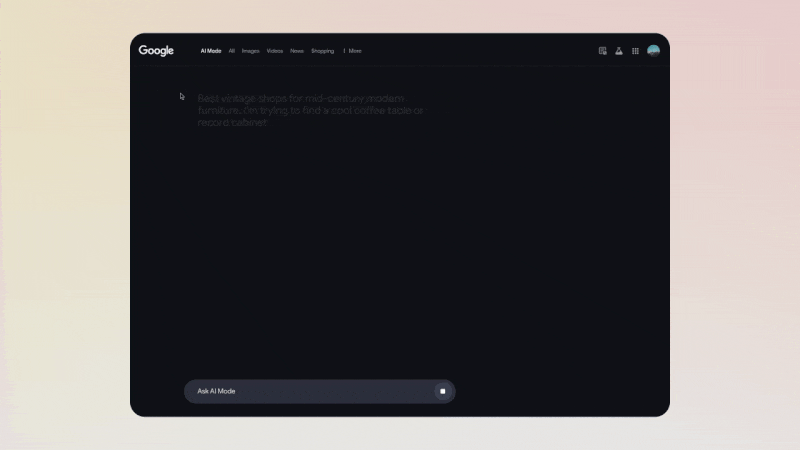Google’s integration of AI directly into its search platform marks a turning point in how users discover information online. The introduction of AI Mode represents one of the most substantial changes to Google Search in years, which will definitely change how both user experiences the process of finding information, and how commerce deals with SEO.
The Dawn of AI-Powered Search
In the coming weeks, a select percentage of US users will begin seeing an AI Mode tab prominently positioned within Google Search. This limited rollout marks Google’s first public deployment of this search-centric AI technology outside its experimental Labs environment.
Unlike traditional search results that present a collection of website links based on user queries, AI Mode delivers AI-generated responses drawn directly from Google’s extensive search index. This approach differs from the AI Overviews already available, which place an AI-generated information summary between the search box and conventional web results.
Users will find this new feature in a dedicated tab positioned at the front of the Search tab lineup, preceding the familiar “All,” “Images,” “Videos,” and “Shopping” tabs. This positioning reflects Google’s strategic prioritization of this new search paradigm.
Google’s Answer to Emerging AI Search Competitors
Google’s AI Mode represents the company’s response to emerging large language model-powered search engines such as Perplexity and OpenAI’s ChatGPT search capabilities. These specialized AI models excel at web access and real-time data retrieval compared to standard chatbots like Gemini, enhancing their ability to deliver relevant, up-to-date responses.
This move signals Google’s determination to maintain its dominance in the search market against these new AI-centric challengers. By integrating conversational AI capabilities directly into its core search product, Google aims to offer users the best of both worlds: the comprehensive coverage of traditional search combined with the intuitive interface of conversational AI.
Expanded Access and Enhanced Features
Google is simultaneously eliminating the waitlist for US Labs users who wish to test AI Mode, enabling more individuals to experience this search feature before its widespread release.
The company has also implemented several significant upgrades to AI Mode’s functionality:
A new persistence feature saves previous searches to a panel on the left side of the interface, allowing users to quickly revisit topics or pose follow-up questions without initiating a new conversation thread.
Visual, interactive cards for products and locations are beginning to appear within AI Mode. These cards provide valuable contextual information such as business hours, reviews, and ratings for establishments, as well as images, inventory status, shipping information, and current pricing for purchasable items.
Implications for SEO and Digital Marketing
The introduction of AI Mode raises profound questions for website owners and SEO professionals. As users increasingly engage with AI-generated responses rather than traditional search results, the value of appearing in the top positions of conventional search results may diminish.
This shift could fundamentally alter optimization strategies. Rather than focusing exclusively on ranking factors for traditional search results, content creators may need to prioritize being cited as sources within AI-generated responses. This could place greater emphasis on establishing authoritative content that AI systems recognize as valuable information sources. Website developers, such as Ronins, will also need to factor in the fundamentals that will be required for establishing a web build that helps content flourish more so than ever before.
Website owners may need to adapt their content to better serve as reference material for AI systems while still maintaining appeal for human readers. This dual optimization challenge represents perhaps the most significant shift in SEO strategy since the rise of mobile search.
The Future of Information Discovery
Google’s AI Mode represents more than just a new feature—it signals a fundamental rethinking of how information is discovered and consumed online. By merging the comprehensive coverage of traditional search with the conversational capabilities of advanced AI, Google is creating a hybrid approach that could redefine user expectations.
As this technology matures and expands beyond its initial limited release, both users and content creators will need to adapt to this new paradigm. The lines between traditional search, conversational AI, and personalized recommendations continue to blur, creating both challenges and opportunities for those who can successfully navigate this evolving landscape.
If you are interested in this topic, we suggest you check our articles:
- Gemma 3: Introducing Google’s Latest Open AI Model
- Google DeepMind’s New AI Models for Robotics
- Google’s Gemini Robotics and Gemini Robotics-ER: Intelligent Machines That Adapt and Learn
Sources: TheVerge
Written by Alius Noreika


